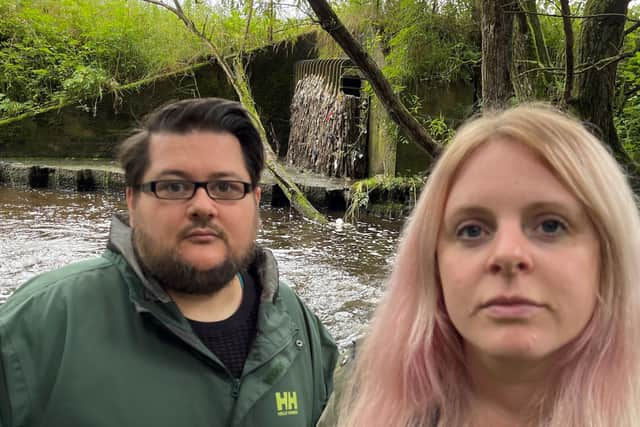Calls for action after campaigners discover raw sewage dumped in Burnley river where children play
and live on Freeview channel 276
Green Party councillor Andy Fewings said he was 'shocked and appalled' when research he conducted revealed the findings in the River Calder at the Crow Wood Farm combined sewer overflow (CSO) and other United Utilities plant in the Burnley area.
Coun. Fewings said he has contacted United Utilities as a 'matter of urgency,' saying: "This is completely outrageous.
Advertisement
Hide AdAdvertisement
Hide Ad"I have contacted United Utilities to ask them to urgently upgrade their facilities in Burnley so they have the necessary tanks and equipment that mean they do not have to dump sewage into the river any longer.


"Given the widely reported large profits of the water companies I assume that funding will be available and I hope that this will be implemented as a matter of urgency."
Coun. Fewings carried out the research with fellow Green Party member and environmental campaigner Emma Simpkin.
Their research revealed that the Crow Wood Farm CSO during 2020 discharged raw sewage into the River Calder 132 times for a total of 601 hours.
Advertisement
Hide AdAdvertisement
Hide AdAlso known as a stormwater regulator a CSO is designed to act as a kind of safety valve that diverts excess wet weather flow, enabling the plant to continue operating and preventing upstream flooding.
Coun. Fewings added: "Children paddle in these rivers and it is horrifying to read the statistics."
A spokesman for United Utilities said the company takes its environmental responsibilities 'very seriously' and agreed that further investment in sewerage infrastructure is needed to modernise the system and improve water quality.
The spokesman said: "During storm conditions, when sewers and treatment plants are operating at full capacity, we are permitted to spill excess storm water from Combined Sewer Overflows (CSOs) to help prevent the flooding of streets, homes and businesses.
Advertisement
Hide AdAdvertisement
Hide Ad"Over the past 20 years, United Utilities has invested £1.2bn improving CSOs to reduce the amount and impact of spills.
"Sewer networks have been designed this way for decades but, in recent times, more people have told us they do not like the idea of untreated sewage going into our rivers and seas, no matter how diluted.
"We agree. However, it will take many years to change how excess rainfall is managed, especially in our region.
"We are fully committed to taking what steps we can to reduce harm, investing in our own assets and working in partnership with others."
Advertisement
Hide AdAdvertisement
Hide AdIn the United Utilities business plan, between 2020 and 2025 the company has stated it will be investing in improvements to a number of combined sewer overflows across the region.
The spokesman added: "In addition, through the sector’s Green Recovery programme, we have committed to investigate 300 more high-spilling overflows. These detailed assessments will help us understand the environmental impact of these overflows and identify the costs and benefits of proposed solutions to inform future investment plans.
"It’s important to appreciate that sewer overflows are just one factor with an impact on river water quality in the UK.
"The Environment Agency estimates that wastewater leads to around 30 per cent of river and sea pollution in the North West, with the remaining 70 per cent due to other causes, such as rain running off highways and farm land, and private drainage being incorrectly connected.
Advertisement
Hide AdAdvertisement
Hide Ad"The water industry has recently published a report which sets out 10 key steps necessary to achieve the radical changes we all want for our rivers and waterways and you can read it here www.water.org.uk/rivers
"We signed a partnership with The Rivers Trust in July this year which will help improve the collaboration between everyone who has an impact on the health of our rivers – United Utilities, local authorities, farmers, industry, government, regulators and others.
"Only by working together can we find cost-effective sustainable solutions to improve water quality."